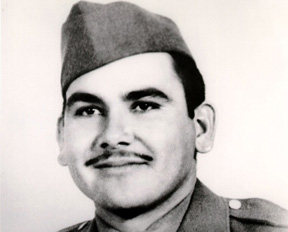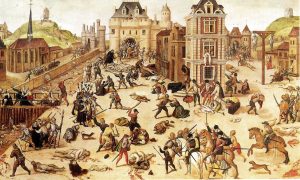
Private Felix E. Longoria from Three Rivers, Texas, was one of the soldiers who gave his life during World War II. Felix Longoria was drafted into the U.S. Army in 1944, and completed six weeks of basic training in Fort Ord, California with the 27th Infantry Regiment of the 25th Infantry Division. He was deployed to Luzon Island for his first combat assignment as an infantry man. He soon volunteered to join a patrol with orders to dislodge enemy snipers. Army Private Longoria was killed in 1945 at the age of 25 by a Japanese sniper and was awarded a Bronze Service Star, a Good Conduct Medal and a Combat Infantryman’s Badge.1 His remains were not recovered and identified until 1949 when they were returned to Three Rivers, Texas, his hometown.2
World War II, a global war, lasted from 1939 to 1945 and was the deadliest conflict in human history. The National WWII Museum reports over 500,000 Latinos (including 350,000 Mexican Americans and 53,000 Puerto Ricans) served in WWII. However, exact numbers are difficult to calculate because except for the 65th Infantry Regiment from Puerto Rico, Latinos were not segregated into their own units the way African Americans were.3 This article is not about World War II itself, instead it tells the story of one of our own Mexican American World War II Heroes from Texas. This affair shows how his community discriminated against him and his family after the war had ended despite his heroic military service for the US.
Three Rivers, Texas is a small town between Corpus Christi and San Antonio known for its hunting and fishing. In the early 1900’s, the main industries were a glass factory and a natural gas refinery. As most towns in the deep South, Three Rivers was ripe with racial segregation and discrimination. In South Texas in the 1940’s, Mexican Americans were treated as second class citizens despite many having their U.S. Citizenship. All were called Mexicans, they were turned away from local shops, swimming pools, and even banned from the barbershops. Signs were posted declaring, “No dogs, no blacks or Mexicans allowed” and “We serve whites only, no Spanish or Mexicans.”4 It was still a time when many Mexican women could only work as cleaning ladies, for Anglo families, sometimes getting paid as little as 15 cents for a day’s work. Mexicans were considered non-white despite being counted as whites on the census.5 World War II caused the nation to reexamine the laws. The Texas Legislator’s 1943 “Caucasian Race Resolution” granting Latin Americans status as “white” citizens notwithstanding.6 Thousands of Latino-American veterans returned from the war to find they were still second class citizens at home. The town of Three Rivers was no exception, Mexican Americans still lived on one side of the railroad tracks with Spanish street names and whites on the nicer side of the tracks.
Small towns were usually quick to acknowledge the death of American Heroes but not for Private Longoria’s. In mourning the death of her husband, Beatrice Longoria was to make arrangements for the wake service that she wanted to hold in their hometown. When she spoke to the Rice Funeral home, the only funeral home in town, the director, Tom Kennedy, declined to plan the service because he explained Felix Longoria was “Mexican” and because “the whites would not like it.”7 Mr. Kennedy was willing to set up a wake at the Longoria home as was the customary treatment of Mexican Americans by the Three Rivers community. Kennedy at one time was in the military, where he fought in Europe, suffered shrapnel wounds and was hospitalized until he went back to the United States. Therefore, it came as a surprise that Kennedy had no compassion for his fallen brother at arms.

Though Felix Longoria’s father had purchased a family plot on the Westside of the town where there was a fence that separated the Mexicans from the all-white burial plots, it was the service for the wake where the outrage began. All Beatrice Longoria wanted was for her husband’s service to be in his hometown with family and friends. Mr. Kennedy angered the Mexican-American community by not allowing the wake to be held at the funeral home. How was it that his ethnicity rather than his ultimate sacrifice for the country mattered more in determining whether he would received a proper burial with full honors. Hurt, confused, and in mourning, Beatrice’s sister Sarah Posas contacted Dr. Hector P. Garcia, a civil rights organizer. Dr. Garcia was no stranger to this type of discrimination so he agreed to help the Longoria family. Many time he was told, “You are not Americans, you are Mexicans” Dr. Garcia would respond by saying, “Well, we are American citizens of Mexican origin, so let’s point out to the people we are really Americans”.8 As a civil rights activist, he used his wartime skills to organize the community. He then contacted Senator Lyndon B. Johnson in Washington. Senator Johnson saw this as a national cause and took it all the way to the White House. The decision to bury Felix Longoria in a place other than Three Rivers became a collective demand for justice, dignity and equality. With collaborated work from Dr. Garcia and Senator Johnson, Felix Longoria’s remains were re-interred on February 16, 1949 in Arlington National Cemetery with full military honors.9 Dr. Garcia founded the American GI Forum in 1948 to help Military Veterans who needed assistance to receive the services and benefits they had earned as soldiers.
In 2010, Santiago Hernandez a resident from Corpus Christi gained permission from the funeral home owner to place a Texas Historical Marker on the property in memory of Felix Longoria. This came with some opposition from many white commission members, but the marker was placed. In 2014, under new management, the funeral home was demolished and converted into a parking lot. The original historical marker was allegedly hit by a driver who backed up into it and was removed. Santiago Hernandez later tried to convince the Three Rivers community to rename the local post office after Private Felix Longoria since the Texas Historical Marker had been damaged and not replaced. 10 Many community residents did not support the idea. Since the post office is a Federal building, renaming it requires a bill in the US Congress. Mr. Hernandez then contacted Congressman Lloyd Doggett who represented the Three Rivers area to inquire whether he would help change the name of the Post Office to honor Longoria. On July 22, 2004 Congressman Doggett proposed to the House of Representatives Bill 4911 that designated the United States Postal Service located in Three Rivers, Texas, as the “Private Felix Z. Longoria Veterans’ Memorial Post Office”.11

After all these years, the story about Felix Longoria, which became a catalyst for the American GI Forum and the spread of civil rights and pride among Mexican Americans is rarely spoken about in Three Rivers, Texas. Many residents still deny discrimination and segregation within the town were the motives. Talking to the townspeople many say, “This was never about race”.12 The discrimination against Felix Longoria remain unspoken when travelers from distant areas come to learn about where the Longoria Affair began. You would assume, given that a historical moment occurred in Three Rivers would be especially vigilant about anything involving the Longorias and the right for equality, but no one-including the mayor, the owner of the property who reportedly tore down the structure and members of the historical commission would speak about Felix Longoria. The Felix Longoria marker was replaced years later, it is now located on the city square in Three Rivers. 13

Some might ask why resurrect such memories and not just let the memory of Felix Longoria rest in Arlington National Cemetery alongside all other war heroes. This ghost of their past haunts the town and many would prefer to forget about it. However, communities must make amends for the many wounds inflicted by discrimination against the heroes who sacrificed their lives for the United States of America. The Historic Marker is but one small way to redress decades of open discrimination against Mexican American Veterans. This fight and ultimate victory that validates the full Citizenship rights of those born American and from Hispanic or Mexican ethnicity changed the lives of everyone in the town. Private Felix Longoria made history while alive in World War II and after his death continued to challenged discrimination in Three Rivers, Texas. While it may be a time in history some would rather not remember, the Longoria Affair sheds light, honor, and prestige forever on the Mexican American Community and the sacrifices of Gold Star families regardless of ethnicity.
- Patricia Portales, “An affair to Remember,” in San Antonio Current, august 11, 2010. ↵
- “Felix Longoria,” 1994-2011, Arlington National Cemetery, Website. www.arlingtoncemetery.net. ↵
- The National World War II Museum, Los Veteranos – Latinos in WWII, retrieve on 5/1/2020 from www.nationalww2museum.org . ↵
- Ruben Narrette Jr., “Navarette: Injustice for an American Veteran”, Press Democrat, November 10, 2010. ↵
- Ruben Narrette Jr., “Navarette: Injustice for an American Veteran”, Press Democrat, November 10, 2010. ↵
- Zachary Foust, “Caucasian Race Resolution’, July 9, 2019, Handbook of Texas Online, http://www.tshaonline.org/handbook/online/articles/mlc04. ↵
- Patricia Portales, “An affair to Remember,” in San Antonio Current, august 11, 2010. ↵
- Hector Garcia, interview, Mexican American Experience, July 9, 1969, hosted by David G. McComb, https://www.drhectorgarciafoundation.org. ↵
- Carroll, Patrick. Felix Longoria’s Wake, Publisher: The University of Texas Press, 2003. ↵
- John J. Valadez, The Longoria Affair. (2010) Boston: PB Distribution 2010. DVD. ↵
- R. 4911, July 22, 2004, 108th Congress 2 D Session. ↵
- Bob Richter, “Consider the other side of the ‘Longoria affair,'” San Antonio Express News, January 7, 2012. ↵
- Elaine Ayala, “Longoria marker to get new spot in Three Rivers,” San Antonio Express News 2015. ↵



92 comments
Mikayla Trejo
This piece was incredibly impactful. Learning about the discrimination in a post war Texas is extremely important as we can remember that this discrimination wasn’t as long ago as we think. Learning about the treatment of this veteran in a town that isn’t that far from San Antonio, is extremely disheartening. Thank you for sharing Felix Longoria’s story.
Alexis Silva
Mexican-American history is rarely taught or spoken about because it is not required in school, so people tend to forget its importance. I appreciate the time taken to dedicate a study towards Private Felix E. Longoria, while highlighting his significance to the civil rights movement for Mexican Americans. I would recommend making the font bigger while incorporating more pictures to fully capture the significance of Private Felix E. Longoria
linda
I enjoyed reading about Felix Longoria who honorably served our nation. It is unfortunate that his family could not bury him near his hometown, but he was finally buried at Arlington National Cemetery with full military honors. This article demonstrated that when people gather for a good cause change happens. It is difficult to read about the struggles of Mexican American during this time but I am glad to see that he was honored.
Professor Joseph M Fonseca, Jr
This has been 1 of best research papers on Felix that I Have read in a long time, well researched, Documented. Glad to see that the Marker is back where it belongs, and not hidden. 3 Rivers has always tried to keep this Hidden. Shameful !
jcortez24
Good evening Lulu, I found your research really interesting and everything you found. I would use a bigger font next time since it’s so much information. I thought it was really amazing, including those pictures. I found it interesting to actually see the marker in three rivers since you talked about it in your research, it was nice to see a picture to actually show more of the significance it has with people.
ldena
This was a great piece of information, the first paragraph definitely had me hooked which led to a great reading. I actually had never heard of Private Longorias story, its a very sad one especially since I am also of the same origin so it was hard to imagine that thats what life was like for us during that time period. I thought it was sad that someone gave up their life for a country that didn’t even fully respect them, and even more sad that they weren’t allowed to be honored in the right way until later. Overall this was some great information on a great story that was engaging and easy to read, great work.
aramon11
Lulu you are doing excellent work by highlighting a hero not just to Americans, but especially us Mexican Americans. It is downright gross to hear about the treatment that people like us faced in those days even after serving our country. Felix Longoria deserved to be honored and I’m glad his family stuck up for his memory. I’m glad leaders like LBJ rose to the occasion and took up the fight with the Longoria family. I’ve been through Three Rivers before, but never heard this story before. Thank you for covering it.
lsahadi
I found your article very enlightening. I’ve never heard of Felix Longoria before. After hearing his story it’s sad that a hero who died for this country couldn’t be honored because of his race. It shows how common racism in the workplace is. In my opinion I think racism has gotten worst in the past few years. This was a really good article and a very important subject matter.
esaucedomoreno
I really liked this article because it gave a lot of historical insight and it also talked a lot about discrimination in the mid 20-century. I was surprised with how I was able to learn from this article regarding the civil rights movement, and more importantly, Felix E. Longoria. He was a WWII hero who ended to getting killed by a Japanese sniper in 1945. Moreover, The use of pictures in this article helped me comprehend what was being talked about in the article. Overall, this was a very fun read because I was able to learn new things as well as get inspired for my infographic project.
dolivaresvasqu
Enjoyed learning about Mr.Longoria, being in Texas I’m surprised I haven’t heard of him yet. Happy to know that even though he served during a time of segregation in the end he was able to be buried on proper grounds with his proper honors and even had the local post office building named after him. It is odd that those who discriminated against him won’t speak on the history it seems the discrimination against him still continues in that area. Also glad to know that Lyndon B. Johnson gave him his recognition and considered his issue an important one.